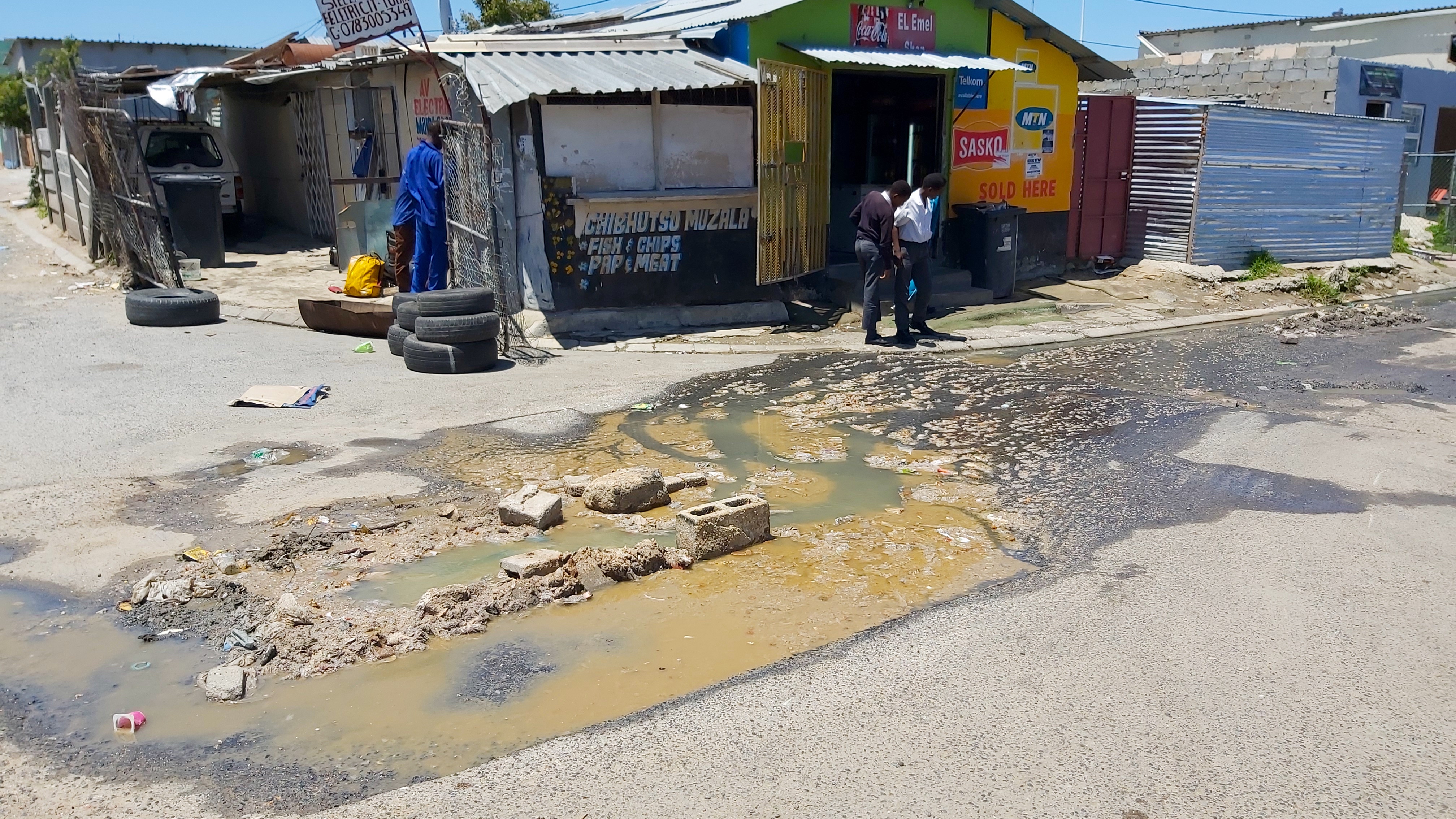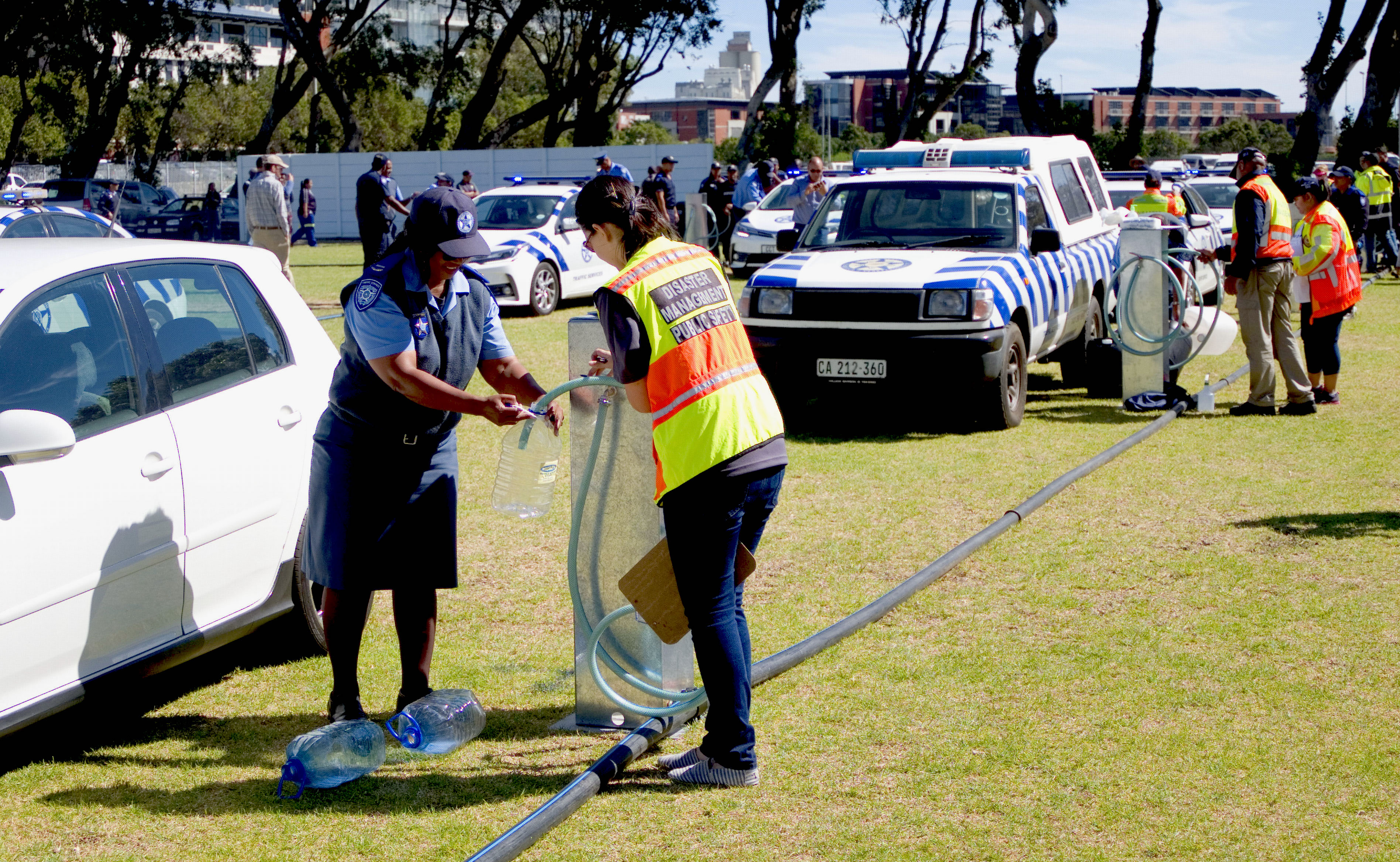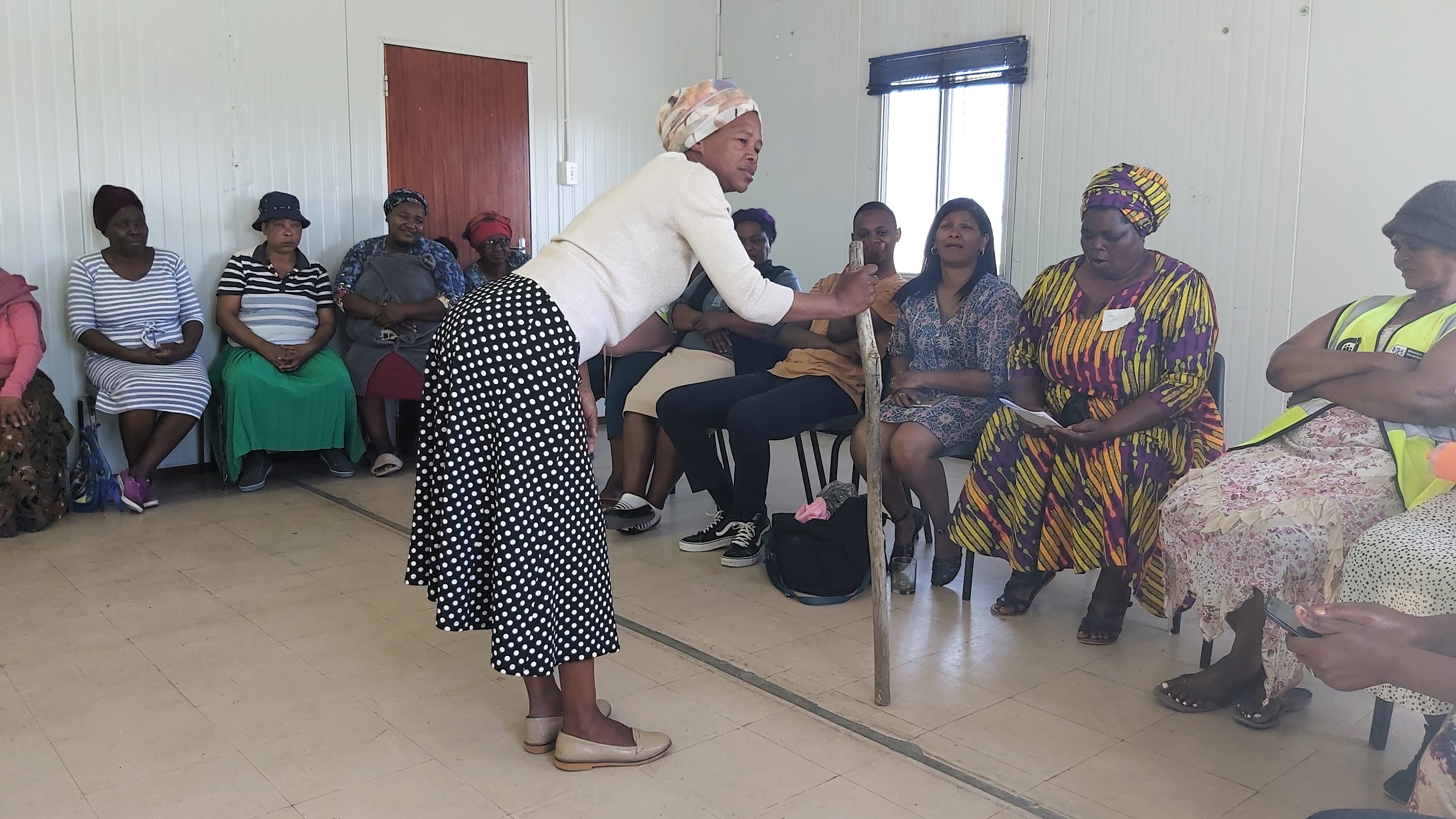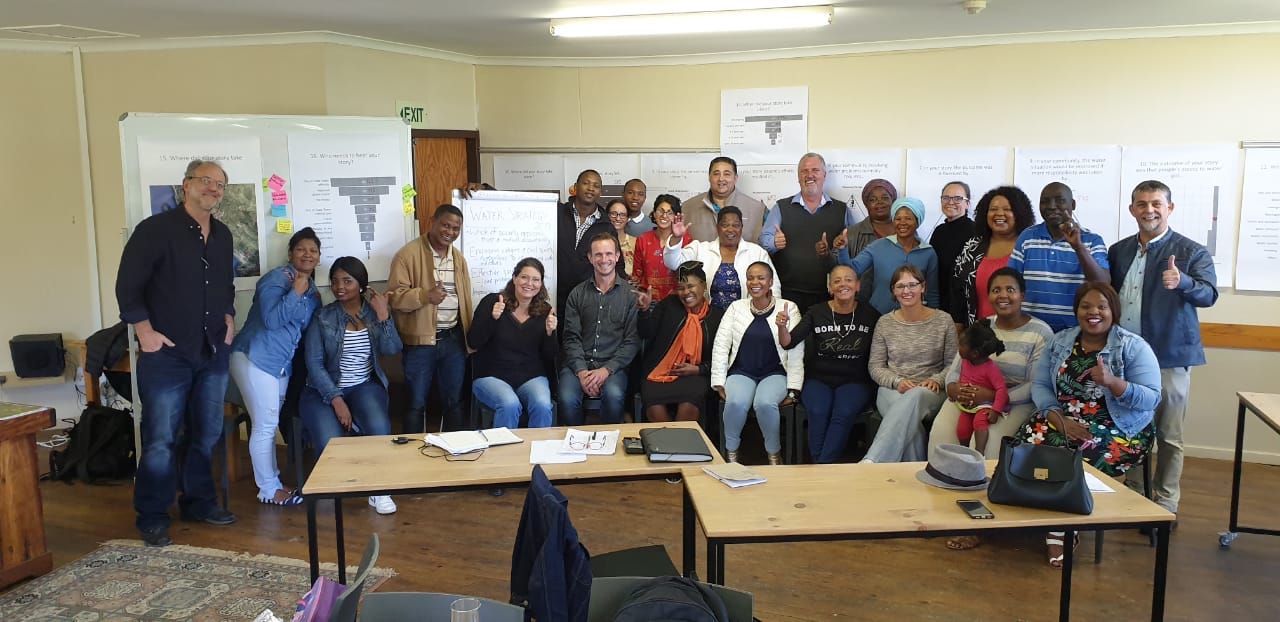
Project objectives
-
Understand drought governance at the city scale.
-
Understand water access and governance issues at the neighbourhood scale (sub-project known as CoReCT - see more details here).
-
Explore possibilities for strengthening multilevel governance between the city and local level to build resilience.
Scientific interest
Much attention was directed to the ’Day Zero’ narrative in the wake of Cape Town’s recent drought. However, this only tells a part of the story of Cape Town’s water woes, which extend beyond water scarcity to seasonal flooding, sanitation and basic services, as well as water justice and inequality. How can we build an understanding that better integrates this broader set of issues? What does this entail for climate change adaptation – how can we build relevant knowledge and capacity to address inequality and injustice in addition to the pressing environmental issues?
Project approach
This project takes an interdisciplinary and transdisciplinary approach to ask questions about what urban resilience means in theory and practice and how it relates to social justice, water and cross-scalar governance. Understanding diverse perspectives from academics, practitioners and residents on how water resilience might be better addressed to improve cities, livelihoods and wellbeing helps to surface potential incommensurabilities. Acknowledging incommensurabilities, or issues that are seen from different perspectives and have “no common measure” makes it hard to find agreement on how water challenges might be addressed. When there are competing world views, people will tend to talk at cross-purposes.
Often in urban governance, marginal communities’ voices and views are not privileged, leading to dissatisfaction, frustration and loss of trust in service providers. Explicitly surfacing disparities can start to shift how actors see the problem and how potential solutions might be differently defined and implemented. However, better understanding of different government officials’ views of water issues remains equally important, as their central role means they can constrain and enable how these issues can be addressed, both in terms of their world views and conceptualizations, as well as the resources and technologies they bring to bear.
The intention is that the project contributes to filling a gap, both in the academic field as well as in the field of practice, where alternative responses to urban water resilience can be creatively explored, with the goal of finding better alignment where possible or surfacing the problematic conflicts more explicitly.
Understanding drought governance at the city scale
Although the Cape Town drought caught media attention across the world, unpacking how the drought unfolded was complex because of the multi-dimensional nature of the problem that included understanding water availability and infrastructure, climate variability and change, economic and social impacts as well as the governance of the national, provincial and city response and different responses across the City.

As part of the AXA project, Associate Professor Gina Ziervogel was well positioned to explore the question of how the drought was governed and some of the lessons learned and implications for future climate and disaster risk. Dr Johan Enqvist was also involved, contributing expertise on community perspectives on and involvement in addressing urban sustainability issues together with his growing knowledge of the drought. An initial paper outlining the challenges of water and social justice and framing the Day Zero crisis in a broader water governance context in Cape Town was produced and published in WIRES Water (Enqvist and Ziervogel 2019).
Ass Prof Ziervogel was appointed to the City of Cape Town’s Water Resilience Advisory Committee in 2017 to provide expert input on the City’s drought plans. She was also asked to lead a research project/study on climate change for National Treasury’s City Support Programme, specifically exploring the water crisis response. Drawing on interviews with City officials and observation from engagement in many processes, she produced a report on lessons learned from the drought that was shared with other municipalities in South Africa. It was presented at the National Budget Forum that feeds into the country’s metros’ decision making. This work around drought and water issues, which is often seen as the responsibility of environment and water departments, was now being recognised as a city-wide priority.
Drawing on the interview material, Gina worked with a journalist to produce a book, Day Zero: One city’s response to a record-breaking drought. Her aim was to ensure that the citizens of Cape Town and interested parties globally could understand more about what happened within the City during the drought. She feels that citizens needed to better understand urban governance in order to hold government accountable and understand what their role might be in building water resilience.
The list of output related to drought governance at the city scale are here.
Understanding water access and governance issues at the neighbourhood scale - Community Resilience in Cape Town (CoReCT)
One of the gaps in managing water at the City level is the limited public engagement in water issues and exclusion of different social perspectives. To address this, the AXA urban water governance project has been working with a local NGO, the Environmental Monitoring Group, and a social movement, the Western Cape Water Caucus on an action learning project. As part of this, the activists wanted to develop their research skills and document evidence about challenges with water access in the low-income communities where they lived. Along with some other academics, the team developed a transdisciplinary research process using the SenseMaker methodology to collect over 311 stories and associated data about water access. Through this work relationships between City of Cape Town officials and the Caucus have been strengthened, leading to plans for water dialogues that were unfortunately put on hold due to COVID-19.
The new City Water Strategy has identified the need for community-generated data and working in a more collaborative way with different stakeholders. The SenseMaker work talks directly to this as it captures the lived realities of poorer households’ struggle with water access and seeks to provide a voice for those often not heard. Work at both the neighbourhood level and City level is continuing on how to take these issues forward.
Western Cape Water Caucus action research
-
Working with the grassroots social movement, this activity has aimed to support low-income residents in mobilising around water-related concerns
-
Activities have entailed a series of 4 workshops and capacity-building activities around documenting water stories and identifying options for action
-
Support has been given to local communities to engage in actions related to different themes, particularly to respond to the needs in the different areas during the COVID-19 pandemic.
Sensemaker CoReCT project
-
Collaborative project with Stellenbosch University, Environmental Monitoring Group and the Western Cape Water Caucus, to gather qualitative stories of water access and use in residential areas across Cape Town
-
Method centred around the Sensemaker approach, adapted to accommodate a co-design process where interview questionnaires and data collection was developed jointly by academics and Water Caucus members
-
Build research capacity of Western Cape Water
-
Collaborating with the City of Cape Town to explore how to use this research in re-thinking about the City addresses water access challenges and engagement with residents
Cape Town Drought Response Learning Initiative (CDRLI)
The CDRLI was undertaken with the aim of learning from the 2017-2018 Cape Town water crisis. This crisis event, this has global relevance, is capable of yielding lessons applicable worldwide and well beyond the sphere of water management. The initiative documented observations, insights and reflections on the crisis using in-depth filmed interviews with individuals across a range of sectors who were involved in crafting the city’s response to the drought. From these interviews a number of curated series of short films were produced encapsulating key learnings.
During the first phase of the initiative, 39 interviews were conducted and filmed creating a rich resource of 43 hours of material, constituting the largest collection of first-hand reflections on the drought and the Cape Town water crisis. Interviewees were deliberately selected to represent a variety of viewpoints, backgrounds and sectors, including government, business, agriculture, non-profit and non-government organisations, research and academia, independent consultancy and civil society. Between them they brought to the project expertise ranging over a widely diverse collection of disciplines and subject areas. This yielded a wealth of recollections, observations, assessments, reflections, insights and points of view on the subject, capturing thinking shortly after the crisis that would otherwise have been lost, now all gathered in one place.

Insights
Drought governance insights
A number of policy insights emerged from the city-level drought governance work around how to reduce risk of drought crisis in cities:
AREA 1: STRENGTHEN GOVERNANCE
-
Build systems and relationships of mutual accountability for effective water management between spheres of government.
-
Strengthen horizontal management between municipal departments and entities
-
Strengthen leadership and the capacity to enable flexible, adaptive decision-making
-
Invest in partnerships beyond the City
AREA 2: DATA, EXPERTISE AND COMMUNICATION
-
Understand the local water system
-
Share information about the water situation to build public trust
-
Actively seek external expertise and experience
AREA 3: TAKE A SYSTEMS APPROACH
-
Actively manage and integrate diverse part of the water system
-
Create a robust networked system of water supply
-
Recognise the limitations of the current financial model for water
AREA 4: BUILD ADAPTIVE CAPACITY
-
Strengthen leadership and the capacity to enable flexible, adaptive decision-making
-
Develop a water sensitive city vision
-
Integrate climate change into water planning
CoReCT project insights
The aim of the CoReCT project has been to amplify the voices of residents in low-income and informal settlements and build capacity of a local social movement to continue such work. Drawing on this community-generated data helps to understand the mismatch between government interventions and people’s lived realities. It also generated new skills and knowledge to empower the community activists in their efforts to address water injustice in the city.
A number of policy insights have emerged from the CoReCT project that help to focus on collaborative engagements between local government and communities in the water sector:
-
Implementing top-down technical solutions without addressing underlying complex social-economic-ecological problems easily lead to unreliable service delivery and frustration among residents
-
Residents often resort to relying on informal or illegal alternatives to resolve water issues, both in informal settlements and in low-income areas technically classified as formal but sharing many informal characteristics such as overcrowding and poorly maintained and inadequate infrastructure.
- In order to address equity and justice issues as well as climate risk, adaptation policy needs to better support transformative adaptation.
- Adaptation policy for capacity building would benefit from a broader understanding of governance that includes local participation and values bottom-up contributions.
- Co-creating knowledge helps to legitimize knowledge of marginalized stakeholders and sharing this knowledge can gain them a "seat at the table" for policy level discussions to integrate their perspectives into higher-level adaptation measures.

Project Outputs
Workshop
The Equitable Urban Climate Adaptation Workshop, hosted by Associate Professor Gina Ziervogel, was held in Noordhoek, Cape Town from the 19th to the 20th of September 2022, funded by AXA Research Fund. The workshop brought together 25 academics and practitioners from around South and southern Africa, and a few from Europe, to explore and collaborate on the main priorities for equitable urban climate adaptation in African cities. Facilitated by Alison McCallum, the workshop provided an opportunity for researchers and practitioners to unpack equitable urban climate adaptation and work together to reveal key priorities, challenges and possible next steps.
Journal papers
-
Peirson, A. E., and G. Ziervogel. 2021. Sanitation Upgrading as Climate Action: Lessons for Local Government from a Community Informal Settlement Project in Cape Town. Sustainability 13(8598).
Click here to view the article | Click here to view the briefing notes
-
Fox, A., G. Ziervogel, and S. Scheba. 2021. Strengthening community-based adaptation for urban transformation: managing flood risk in informal settlements in Cape Town. Local Environment 0(0):1–15.
Click here to view the article | Click here to view the briefing notes
-
Ziervogel, G., J. Enqvist, L. Metelerkamp, and J. van Breda. 2021. Supporting transformative climate adaptation: Community-level capacity building and knowledge co-creation in South Africa. Climate Policy 0(0):1–16.
Click here to view the article | Click here to view the briefing notes
-
Enqvist, J., G. Ziervogel, L. Metelerkamp, J. van Breda, N. Dondi, T. Lusithi, A. Mdunyelwa, Z. Mgwigwi, M. Mhlalisi, S. Myeza, G. Nomela, A. October, W. Rangana, and M. Yalabi. 2020. Informality and water justice: community perspectives on water issues in Cape Town’s low-income neighbourhoods. International Journal of Water Resources Development.
Click here to view the article
- Ziervogel, G. 2020. Climate urbanism through the lens of informal settlements. Urban Geography 00(00):1–5
Click here to view the article | Click here to view the briefing notes
- Matikinca, P., G. Ziervogel, and J. P. Enqvist. 2020. Drought response impacts on household water use practices in Cape Town, South Africa. Water Policy:1–18.
Click here to view the article | Click here to view the briefing notes
- Enqvist, J.P. & Ziervogel, G., 2019. Water governance and justice in Cape Townâ¯: An overview. WIRES Water, 6, pp.1–15.
Click here to view the article
-
Ziervogel, G., 2019. Building transformative capacity for adaptation planning and implementation that works for the urban poor: Insights from South Africa. Ambio, 48(5), pp.494–506.
Click here to view the article
-
Ziervogel, G., New, M. and W. Liu. (2019). Making cities water-wise and climate-resilient-Lessons and experience from the Cape Town drought. Landscape Architecture Frontiers 7(3):94–99.
Click here to view the article
-
Ziervogel, G. 2018. Climate Adaptation and Water Scarcity in Southern Africa. Current History. 181-186.
Click here to view the article
Book chapter
-
Enqvist J. and G. Ziervogel (2021). Multilevel governance for urban water resilience in Bengaluru and Cape Town. In: Baird & Plummer (eds.). Water Resilience: Management and Governance in Times of Change, pp. 193-212. Springer Nature Switzerland. https://www.springer.com/gp/book/9783030481094
City level drought governance work
Book and short movie: www.dayzero.org.za
Report
- Ziervogel, G., 2019. Unpacking the Cape Town drought: lessons learned, Cape Town. African Centre for Cities, University of Cape Town. https://www.africancentreforcities.net/unpacking-cape-town-drought-lessons-learned/
- Ziervogel, G. 2019. What the Cape Town drought taught us: 4 focus areas for local government. Briefing note. African Centre for Cities, University of Cape Town. https://www.africancentreforcities.net/unpacking-cape-town-drought-lessons-learned/
Popular articles
- Conversation article: What Cape Town’s drought can teach other cities about climate adaptation. April 3, 2019 https://theconversation.com/what-cape-towns-drought-can-teach-other-cities-about-climate-adaptation-114379
Presentations
- Gina Ziervogel. How the drought unfolded within the city of Cape Town. Creative Mornings. Cape Town. April 2 2019. https://creativemornings.com/talks/gina-ziervogel
Radio and television interviews
- http://www.capetalk.co.za/podcasts/144/the-john-maytham-show/194332/unpacking-the-cape-town-drought-lessons-learned
- http://www.capetalk.co.za/podcasts/294/upfront-with-refilwe-moloto/196525/unpacking-the-cape-town-drought-lessons-learnt
- SABC https://youtu.be/30ofbfuBU5E
Earlier papers that underpinned this work
- Borie, M., Ziervogel, G., Taylor, F., Millington, J., Sitas, R. and Pelling, M. (2019) Mapping (for) resilience across city scales: An opportunity to open-up conversations for more inclusive resilience policyâ¯?, Environmental Science and Policy. 99,1–9. doi: 10.1016/j.envsci.2019.05.014
- Borie, M., Pelling, M., Ziervogel, G. and Hyams, K. (2019). Mapping narratives of urban resilience in the global south. Global Environmental Change, 54, 203–213.
- Jordhus-Lier, D., A. Saaghus, D. Scott, and G. Ziervogel. (2019). Adaptation to flooding, pathway to housing or ‘wasteful expenditure’? Governance configurations and local policy subversion in a flood-prone informal settlement in Cape Town. Geoforum 98:55–65.
- Harris, L.M., Chu, E. & Ziervogel, G., (2017). Negotiated resilience. Resilience.
- Mahlanza, L., Ziervogel, G. & Scott, D., (2016). Water, Rights and Poverty: an Environmental Justice Approach to Analysing Water Management Devices in Cape Town. Urban Forum.1–20.
- Rodina, L., Baker, L A., Galvin, M., Golden, J., Harris, L M., Manungfala, T., Musemwa, M., Sutherland, C., & G. Ziervogel (2017). Water, equity and resilience in Southern Africa: future directions for research and practice. Current Opinion in Environmental Sustainability 26-27: 143-151.
- Ziervogel, G. et al. (2017). Inserting Rights and Justice into Urban Resilience: A Focus on Everyday Risk. Environment and Urbanization, 29(1), pp.123–138.
- Ziervogel, G., Archer van Garderen, E. and Price, P. (2016). Strengthening the science-policy interface through co-production of a climate adaptation plan: leveraging opportunities in Bergrivier municipality, South Africa. Environment and Urbanization. 1-20.
- Ziervogel, G., Cowen, A. & Ziniades, J., (2016). Moving from adaptive to transformative capacity: building foundations for inclusive, thriving and regenerative urban settlements. Sustainability, 8, pp.1–26.
- Ziervogel, G., Waddell, J., Smit, W. and Taylor, A. (2016). Flooding in Cape Town’s Informal Settlements: Barriers to Collaborative Urban Risk Governance. South African Geographical Journal 98 (1): 1–20. doi:10.1080/03736245.2014.924867.
Project team
University of Cape Town (UCT)
-
Gina Ziervogel (principal investigator)
-
Johan Enqvist (lead researcher)
UCT Students
-
Megan Bieber (Honours 2019) Thesis title: Investigating barriers to climate adaptation: A case of organisations in Atlantis adapting to the 2015-2018 drought
-
Alice Foggitt (Masters 2021). Thesis title: Understanding multiple health risks for low-income communities in Cape Town: water stress, COVID-19, and climate change
-
Ashley Fox (Masters 2018) Thesis title: The Political Ecology of Community-based Adaptation
to Flood Risk in Informal Settlements: The Case of a Local Community Organisation -
Erin Hill (Masters 2019) Thesis title: Framing a crisis: The City of Cape Town's communications during the 2017-2018 water crisis
-
Alma Küspert (Honours 2019) Thesis title: Barriers and enablers to multi-level governance: Sanitation upgrading in the Murray informal settlement, Cape Town
-
Lucy Lavirotte (Masters 2019) Thesis title: Loss and damage from droughts: Material and non-material impacts of water scarcity on women farmers in Gugulethu, Cape Town
-
Phikolomzi Matikinca (Masters 2019) Thesis title: How household water use practices changed during the Cape Town drought
-
Thandeka Mkise (Honours 2018) Thesis title: Perceptions on what constitutes of a fair water tariff for residents in the City of Cape Town
Visiting students
-
Kristina Humphreys (Masters 2020) Thesis title: An urgent crisis of chronic neglect: Lessons on water justice and wellbeing in the time of COVID-19; Water issues and health impacts in low income Cape Town communities. Uppsala University, Sweden
-
Helen Meigs (Study abroad 2020) Thesis title: Assessing Cape Town’s Water Strategy Through a Resilience Lens
-
Kyle Richmond-Crosset (Study abroad 2018) Thesis title: Urban water management: Cape Town and water sensitive cities
EMG Team
Siyabonga Myeza, Thabo Lusithi, Apiwe Mdunyelwa and Jessica Wilson were facilitators.
WCWC members who participated in SenseMaker
Ntombikayise Dondi, Zinzi Mgwigwi, Mpumelelo Mhlalisi, Gciniwe Nomela, Ann October, Welekazi Rangana and Maggie Yalabi, Austin Chiradza, Phumza Makeke, Ndileka Matume, Nomthandazo Nxoboyi, Lydia Petersen, Ayeza Mandla, Khayalethu Mateta, Henry Ngwenya, Pumla Nongawuza and Sumaya Witbooi
SenseMaker project researchers
-
John van Breda (CST) researcher
-
Luke Metelerkamp Environmental Learning Research Centre, Rhodes University
City of Cape Town
-
Water and Sanitation Department
-
Resilience Department (with particular support and engagement with Gareth Morgan)
*For more information please contact Gina Ziervogel or Johan Enqvist
Partners and Funder
Environmental Monitoring Group (EMG)
- Link to EMG’s CoReCT project page
- Link to Water Caucus
Funded by AXA Research Fund